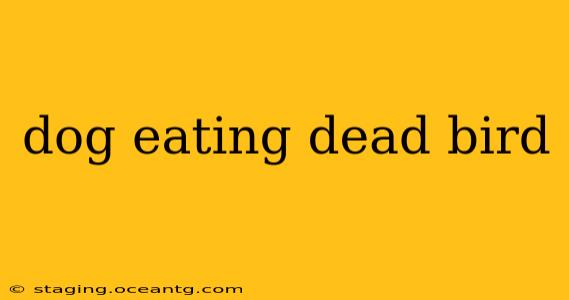Finding your dog with a deceased bird in its mouth is a distressing experience. It's natural to panic, but understanding the potential risks and taking appropriate action is crucial for your pet's health. This guide explores the concerns associated with dogs consuming dead animals, offers advice on what to do, and answers frequently asked questions.
What are the Dangers of a Dog Eating a Dead Bird?
The primary concern when a dog eats a dead bird is the risk of bacterial infections, such as Salmonella, E. coli, and Listeria. These bacteria can cause vomiting, diarrhea, fever, and more serious illness, particularly in puppies or dogs with weakened immune systems. Additionally, dead birds might carry parasites like worms or ticks, which can infest your dog. Finally, depending on the cause of the bird's death, there's a potential risk of poisoning from pesticides, rodenticides, or other toxins.
My Dog Ate a Dead Bird: Should I Be Worried?
Whether you need to worry depends on several factors:
- The size of the bird: A small bird is less likely to cause a significant problem than a larger one.
- Your dog's size: A larger dog might tolerate the ingestion of a small bird better than a smaller dog.
- Your dog's health: A healthy dog has a stronger immune system and is better equipped to handle potential infections.
- The bird's condition: A bird that was obviously diseased or showed signs of decomposition poses a greater risk.
While a small, relatively healthy bird might not cause major issues, it's always best to monitor your dog closely.
What Should I Do if My Dog Eats a Dead Bird?
- Observe your dog closely: Watch for signs of illness such as vomiting, diarrhea, lethargy, loss of appetite, or fever. Note the time the incident occurred.
- Contact your veterinarian: Even if your dog seems fine, it's advisable to contact your vet. They can advise you based on your dog's size, health, and the circumstances. They may recommend inducing vomiting or providing supportive care.
- Prevent future incidents: Secure your trash, keep your yard clean, and discourage your dog from scavenging. Training your dog to leave things alone is crucial.
How Do I Prevent My Dog from Eating Dead Birds?
Prevention is key. Here are some effective strategies:
- Consistent training: Teach your dog a solid "leave it" command. This command is invaluable for preventing your dog from picking up potentially harmful items.
- Secure your property: Ensure your trash cans are properly secured and your yard is clean of any potential attractants.
- Supervise your dog: Keep a close eye on your dog, especially during walks or playtime outdoors.
- Positive reinforcement: Reward your dog for leaving things alone. Positive reinforcement is far more effective than punishment.
What if My Dog is Showing Symptoms After Eating a Dead Bird?
If your dog shows any signs of illness (vomiting, diarrhea, lethargy, etc.), contact your veterinarian immediately. They can provide appropriate treatment, which might include fluid therapy, medication for infection, or other supportive care. Early intervention is vital.
Can a Dead Bird Cause Parvovirus in My Dog?
No. Parvovirus is a highly contagious viral disease that is not transmitted through the consumption of dead animals. While dead birds can carry other dangerous pathogens, parvovirus is transmitted through direct contact with infected feces.
This information is for general guidance only and does not constitute veterinary advice. Always consult your veterinarian for any concerns about your dog's health. Remember, proactive prevention and prompt veterinary attention are the best ways to ensure your furry friend's well-being.
